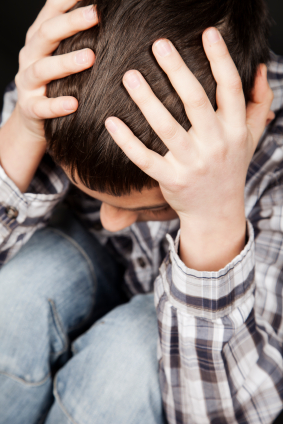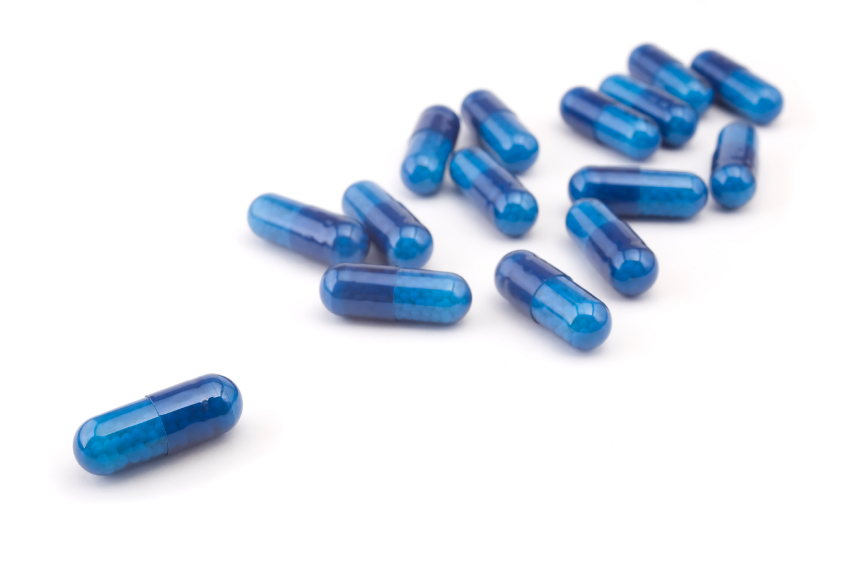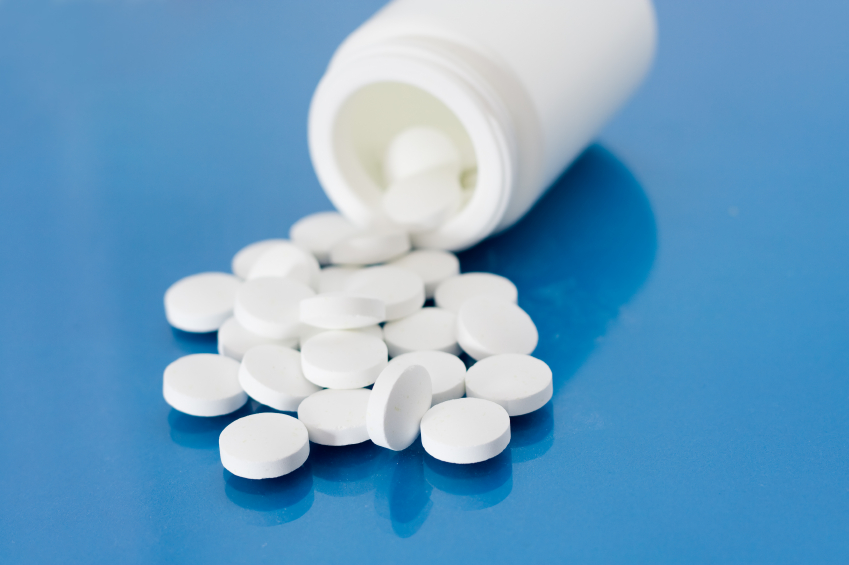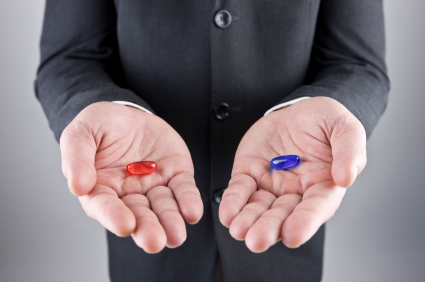Methylene Blue Treats Bipolar Depression in Adults
Methylene blue is a chemical compound that has been used to treat a variety of medical conditions. This drug has some actions that resemble lithium’s: it inhibits guanylate cyclase, which generates second messenger cyclic GMP, and decreases nitric oxide. New evidence shows it may help depression and anxiety in bipolar disorder when added to lamotrigine.
In patients with bipolar disorder who were all treated with lamotrigine, an active 65mg dose of methylene blue three times per day (for a daily total of 195mg) versus 15mg/day (an inactive dose that produces the same side effect of blue urine) was more effective at treating depression and anxiety in a 12-week crossover study. Side effects, in addition to blue urine, included infrequent nausea, diarrhea, headache, and a burning sensation in the urinary tract. Of the 37 randomized study participants, 27 completed both phases of the entire six-month study. Martin Alda, a researcher who presented the double-blind randomized crossover data at the 2014 meeting of the International Society for Bipolar Disorders, indicated that he has also used this preparation clinically with success, although the pharmacy staff who prepared the capsules were not too happy, because everything the drug touches turns blue.
Two Out of Three Studies of Armodafinil Have Failed in Bipolar Depression
At the US Psychiatric Congress in 2013, researcher T. Ketter reported on two recent studies of armodafinal (Neuvigil), which is approved for the treatment of narcolepsy. Doses of 150mg/day did not perform significantly better than placebo in the treatment of bipolar depression (in contrast to an earlier positive study).
Editor’s Note: It appears that this drug will not play a major role in the treatment of bipolar depression, as some had hoped.
Neurosteroid Allopregnanolone May Improve Bipolar Depression
Sherman Brown of the University of Texas Southwestern reports that the neurosteroid allopregnanolone has positive effects in bipolar depression. Patients in Brown’s study received doses of 100mg capsules twice daily during the first week, then one capsule in the morning and two capsules in the evening during the second week, and two capsules in the morning and three capsules in the evening during the third week.
Neurosteroids can change the excitability of neurons through their interactions with the neurotransmitters that carry signals from neurons across synapses. Among the various types of neurotransmitters, GABA plays an inhibitory role, while glutamate is responsible for excitability. Allopregnanolone, which is naturally produced in the body, has positive effects on GABA receptors and inhibitory effects on glutamate NMDA receptors, so that it increases the balance of inhibition (GABA) over excitation (glutamate).
More Evidence That Regular Antidepressants Do Not Work in Bipolar Depression
Psychiatrists most commonly prescribe antidepressants for bipolar depression, but mounting evidence shows that the traditional antidepressants that are effective in unipolar depression are not effective in bipolar disorder. At the 2013 meeting of the American Psychiatric Association, researcher Jessica Lynn Warner reported that among 377 patients with Bipolar I Disorder who were discharged from a hospital, those who were prescribed an antidepressant at discharge were just as likely to be remitted for a new depression than those not given an antidepressant.
The average time to readmission also did not differ across the two groups and was 205 +/- 152 days. Those patients prescribed the serotonin and norepinephrine reuptake inhibitor (SNRI) drug venlafaxine (Effexor) were three times more likely to be readmitted than those not prescribed antidepressants.
These naturalistic data (generated from observations of what doctors normally do and information in the hospital’s clinical notes) resemble those from controlled studies. In the most recent meta-analysis of antidepressants in the treatment of bipolar depression (by researchers Sidor and MacQueen), there appeared to be no benefit to adding antidepressants to ongoing treatment with a mood stabilizer over adding placebo. Randomized studies by this editor Post et al. and Vieta et al. have shown that venlafaxine is more likely to bring about switches into mania than other types of antidepressants such as bupropion or selective serotonin reuptake inhibitors (SSRIs).
In addition, a naturalistic study published by this editor Post et al. in the Journal of Clinical Psychiatry in 2012 showed that the number of times antidepressants were prescribed prior to a patient’s entrance into a treatment network (the Bipolar Collaborative Network) at an average age of 40 was related to their failure to achieve a good response or a remission for a duration of at least six months during prospective treatment.
Editor’s Note: Antidepressants are still the most widely used treatments for bipolar depression, and their popularity over more effective treatments (mood stabilizers and some atypical antipsychotics) probably contributes to the fact that patients with bipolar disorder receiving typical treatment in their communities spend three times as much time in depressions than in manic episodes. Using other treatments first before an antidepressant would appear to do more to prevent bipolar depression. These treatments include mood stabilizers (lithium, lamotrigine, carbamazepine, and valproate); the atypical antipsychotics that are FDA-approved for monotherapy in bipolar depression, lurasidone (Latuda) and quetiapine (Seroquel); and the combination of olanzapine and fluoxetine that goes by the trade name Symbiax.
Evidence from several sources suggests that the SNRI venlafaxine may be a risk factor for switches into mania and lead to re-hospitalizations. Other data suggest that in general, in bipolar depression, augmentation treated with antidepressants should be avoided in several cases: in childhood-onset bipolar depression, in mixed states, and in those with a history of rapid cycling (4 or more episodes per year).
FDA Approves Lurasidone for Bipolar Depression
Last year the BNN summarized two presentations from the 2012 meeting of the American Psychiatric Association showing the antidepressant efficacy of the atypical antipsychotic lurasidone (Latuda) in bipolar depression. Lurasidone was more effective than placebo both when prescribed alone (monotherapy) and when prescribed as an add-on to the mood stabilizers lithium or valproate.
In June 2013, the Federal Drug Administration (FDA) approved lurasidone as both a monotherapy and as an adjunctive therapy with lithium or valproate for bipolar depression. Previously the only FDA-approved agents for bipolar depression were the atypical antipsychotic quetiapine (Seroquel) and the combination of the atypical antipsychotic olanzapine and fluoxetine.
Lurasidone’s precise role in therapeutics remains to be explored, but its side effects profile is of particular interest, as it appears to be less sedating than the other atypical antipsychotics noted above. It also appears to have fewer side effects in the realm of weight gain, cholesterol or triglyceride increases, and increases in blood sugar and insulin resistance.
Antibiotic Minocycline Could Improve Bipolar Depression
In an abstract presented at the 2013 meeting of the Society of Biological Psychiatry, Iosifescu et al. reported that the antibiotic minocycline, which has showed anti-inflammatory, neuroprotective, and mitochondrial-sparing effects in animal models, brought about improvement in patients with bipolar depression. Doses of 100mg to 300mg per day were successful in this small open study.
There are some positive placebo-controlled data in patients with schizophrenia who were prescribed this antibiotic. However, until now it had not been studied in bipolar disorder. The preliminary data reported here suggest that controlled double-blind studies of this agent are needed in bipolar depression.
The abstract (#497) can be found in the 2013 convention supplement (9S) to the journal Biological Psychiatry.
Patients with Bipolar Depression Have a Higher Mortality Rate, Especially if They Also Have Cardiovascular Disease
In a large longitudinal study of depressed patients in Taiwan that was published in the Journal of Psychiatric Research this year, Chang et al. found that after 10 years, patients with bipolar depression (N=1,542) had significantly higher mortality rate than those with other types of depression (N=17,480). Patients with bipolar depression were twice as likely to have died from suicide or accidental death than were patients who had other types of depression. When cardiovascular disease was also present in both groups, patients with bipolar disorder were also four times more likely to have died from suicide or accidental death than those with other types of depression.
Editor’s Note: These data again emphasize the critical importance of patients with bipolar disorder carefully looking after their medical and cardiovascular health both early on and throughout the entire course of their illness.
Much of the excess medical mortality in bipolar disorder is attributed to cardiovascular disease, and now those with cardiovascular disease also appear more prone to suicide. This should be a call to action to improve the long-term treatment of both bipolar disorder and its common comorbidity, cardiovascular disease.
Get your medical illness treated!
It will improve your health and longevity. Especially treat these signs of the metabolic syndrome, a major risk factor for cardiovascular disease:
- Cholesterol–Increase “good” cholesterol (high-density lipoproteins or HDLs) and lower “bad” cholesterol (low-density lipoproteins or LDLs)
- High Triglycerides–Triglycerides should be below 150 mg/dL
- Blood Pressure–Aim for 130/85 mmHg or lower
- Blood Sugar–Fasting blood sugar (glucose) should stay below 100 mg/dL
- Overweight & Obesity–Keep waist circumference under 40” for men or 35” for women
Exercise is good for all of these!
The Unfolding Story of Poor Response to Antidepressants in Bipolar Depression
The role of the traditional antidepressants in the treatment of depression in bipolar illness remains controversial. Despite mounting evidence that they are not efficacious in the treatment of bipolar depression, they are still among the most widely used treatments for that condition. At the first biennial conference of the International Society for Bipolar Disorders held in Istanbul this past March, Mark A. Frye and Shigenobu Kanba chaired a symposium on antidepressant-induced mania and individualized treatment for bipolar depression.
This editor (Robert M. Post) discussed factors influencing antidepressants’ effects on patients with bipolar depression. In a recent meta-analysis, researchers Sidor and MacQueen reviewed data from studies encompassing 2373 patients with bipolar depression and found that antidepressants had no significant benefits over placebo on measures of response or remission. Pooled estimates for a thousand patients showed no increase in patients’ risk of switching into mania after treating with antidepressants. However, in a smaller sub-analysis, the risks of switching into mania following treatment with the older tricyclic antidepressants (43%) and venlafaxine (15%) was greater than the risk of switching after being treated with SSRIs (7%) or bupropion (5%).
There is a conundrum in the literature. While antidepressants don’t work very well in bipolar depression, there is a small subgroup of patients who, having responded well to antidepressants for two months, benefit more from continuing the antidepressant treatment than from discontinuing the drug. Continued treatment with adjunctive antidepressants (added to regular treatment with a mood stabilizer or an atypical antipsychotic) was associated with fewer relapses into depression over the next year when the antidepressants were continued compared to when they were discontinued. Lori Altshuler et al. have published two uncontrolled studies to this effect, Russell Joffe et al. have published one, and a more recent randomized study of this by Nassir Ghaemi replicated some of the results in patients who had non-rapid-cycling bipolar disorder. At the same time, the literature shows that there are number of risk factors for switching into hypomania during antidepressant treatment in bipolar depression.
Risk factors for switching into mania upon treatment with an antidepressant include: younger age, bipolar I compared to bipolar II, rapid cycling in the past year, mixed depression, use of older tricyclic antidepressants compared to newer second-generation antidepressants, use of noradrenergic active antidepressants compared to those that act on serotonin or dopamine, and a history of substance abuse. Read more
Treating Bipolar Depression in Youth
 At the Ryan Licht Sang pediatric bipolar conference in March, researcher Karen Dineen Wagner summarized the controlled data on treatment of bipolar depression in children. Almost no data exist, with the exception of one study in which quetiapine (Seroquel) was not found to be more effective than placebo.
At the Ryan Licht Sang pediatric bipolar conference in March, researcher Karen Dineen Wagner summarized the controlled data on treatment of bipolar depression in children. Almost no data exist, with the exception of one study in which quetiapine (Seroquel) was not found to be more effective than placebo.
Unlike mania, for which there are several approved treatments for children aged 10 to 17, there are no FDA-approved treatments for bipolar depression in children.
In adults, quetiapine is the only approved monotherapy for bipolar depression, and the only other approved treatment is the combination of fluoxetine and olanzapine. Despite the frequency with which conventional antidepressants (SSRIs, SNRIs, bupropion, and tricyclic antidepressants) are prescribed for bipolar depression, the data on their efficacy is mostly negative, based on a 2010 meta-analysis by researchers Sidor and MacQueen.
Given that there is little data available even for adults, Wagner reviewed the open (uncontrolled) studies on depression in children with bipolar disorder. Some evidence of good response to lithium or lamotrigine can be found in case series and chart reviews. In studies of atypical antipsychotics for mania in children, the mania rating scales used contain items about depression, and these often show some improvement.
Wagner concluded that one option is to use monotherapy with atypicals, lithium, or lamotrigine in children with bipolar depression.
Wagner created a revised Mood Disorder Questionnaire for Adolescents (MDQ-A), which focuses on a possible diagnosis of bipolar disorder instead of unipolar depression. This was published in the Journal of Clinical Psychiatry in 2006 and we have reproduced it here. Dr. Wagner indicated that the instrument is more valid when the answers are supplied by a parent than by the adolescent.
Editor’s Note: The lack of research on the treatment of children with bipolar disorder is a public health problem. Read more
New Data Support the Efficacy of Lurasidone for Bipolar Depression
In two recent clinical trials that were presented at the annual meeting of the American Psychiatric Association in May 2012, the atypical antipsychotic lurasidone (Latuda), which is currently used to treat schizophrenia, was associated with significant improvement in bipolar depression compared to placebo. The studies, known as PREVAIL (or Program to Evaluate the Antidepressant Impact of Lurasidone), assessed lurasidone’s efficacy as an adjunctive treatment and as a monotherapy.
PREVAIL 1 assessed lurasidone’s efficacy and safety when the drug was added to treatment with lithium or valproate in bipolar patients who became depressed. In this 6-week study, scores on the Montgomery-Asberg Depression Rating Scale (MADRS) improved significantly more in patients taking lurasidone (20 – 120mg/day; N=183) in addition to their mood stabilizer compared to those who received placebo (N=165) in addition to their mood stabilizer.
In PREVAIL 2, patients received lurasidone at either 20-60mg/day (N=166) or 80-120mg/day (N=169) or placebo (N=170) as a monotherapy for bipolar depression. As measured by MADRS scores, lurasidone was significantly more effective in improving bipolar depression than placebo was by the end of the 6-week study period.
In both studies lurasidone showed significant effects on other measures and endpoints including: improvement in Clinical Global Impressions severity of depression (CGI-BP-S) scores, reductions in anxiety symptoms, and improvement in social or occupational functioning. Lurasidone also produced higher rates of response (50% improvement on the MADRS). The CGI-BP-S improved in patients on lurasidone significantly more than in those on placebo as early as week one.
Editor’s Note: These two trials in bipolar depression suggest new possibilities for treating the depressed phase of bipolar disorder.
In studies of patients with schizophrenia, lurasidone has had an excellent safety and tolerability profile; it is relatively weight neutral and does not increase metabolic indices such cholesterol, triglycerides, or blood sugar.
Lurasidone also has an unusual mechanism of action, blocking serotonin 5HT 7 receptors, that may be related to its antidepressant effects. Antagonism of 5HT 7 receptors has been closely linked to antidepressant effects in studies of animal models of depression by two different investigators, Stephen Stahl and Herb Meltzer. It remains to be seen whether this or some other mechanism of lurasidone accounts for its antidepressant effects.
As we have noted before, since all antipsychotic drugs used in the treatment of schizophrenia (which block dopamine D2 receptors) also show efficacy in mania, it is likely that lurasidone will show the same effects. Studies of the drug in mania have not yet been presented. Lurasidone is not yet FDA-approved for bipolar depression, but the PREVAIL studies may be sufficient for an application for FDA approval of lurasidone for this additional indication.
Currently quetiapine (Seroquel) is the only monotherapy approved for bipolar depression. Studies of two other atypical antipsychotics, ziprasidone (Geodon) and aripiprazole (Abilify), failed to show efficacy in bipolar depression when compared with placebo. Ziprasidone’s effects were similar to those of placebo, while aripiprazole showed evidence of significant improvement in the first weeks of treatment compared to placebo, but these failed to last, perhaps because of overly high doses that led to a high drop-out rate.
Antidepressants used for the treatment of unipolar depression are not FDA-approved for bipolar depression and did not appear to be beneficial compared to placebo in recent meta-analyses by Sidor and MacQueen. These antidepressants include the selective serotonin reuptake inhibitors (SSRIs), mixed serotonin and norepinephrine reuptake inhibitors (SNRIs), the dopamine active drug bupropion, and the older tricyclic antidepressants. Not only are these antidepressants not effective in bipolar depression, but some (especially the tricyclics and the SNRIs) appear to increase risk of switching into mania.
None of the mood stabilizers are FDA-approved for bipolar depression; these include lithium, valproate, carbamazepine, and lamotrigine. Thus, quetiapine has had the unique position of being FDA-approved to treat both phases of bipolar disorder—mania and depression—and for prevention of both mania and depression when used as an adjunct to lithium or valproate.
If the lurasidone data lead to FDA approval of this drug as a monotherapy, it will be only the second monotherapy (after quetiapine) approved for bipolar depression. (The combination of olanzapine and fluoxetine is also approved for this indication.) Since bipolar depression can take a serious toll on patients’ health, cognition, and life expectancy, the prospect of having another effective drug for this phase of the illness is especially promising.










